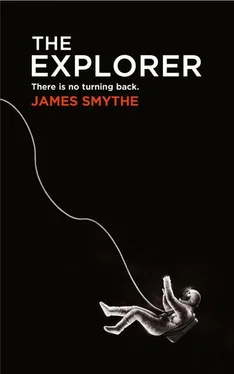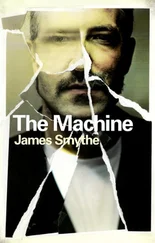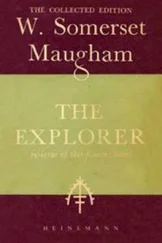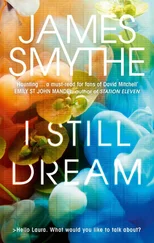James Smythe
THE EXPLORER
I had the ambition to not only go farther than man had gone before, but to go as far as it was possible to go.
– Captain Cook
One of the first things I did when I realized that I was never going to make it home – when I was the only crewmember left, all the others stuffed into their sleeping chambers like rigid, vacuum-packed action figures – was to write up a list of everybody I would never see again; let me wallow in it, swim around in missing them as much as I could. My name is Cormac Easton. I am a journalist and, I suppose, an astronaut. Part of my job on the ship was to be in charge of the communications with home, taking video and writing updates, sending them back to Earth directly. There wasn’t a guarantee of how long any of the broadcasts would take to get there – if they got there at all, as far out as we were, what with the chance of interference – but it was something. It was how I had been sending all my reports, but I assumed that they’d know what to do with something more personal, that they would pass it along. The list was deep. Elena was at the top. I had missed her before we’d even left. On the days leading up to the launch I had been trying to get hold of her, leaving messages, telling her how I felt, because what screwed us up was this , my job, this trip; and I wanted to see if, when it was all over, we could try again. There’s always hope, that’s what they say. As soon as I worked out that there wasn’t ever going to be that chance for reconciliation? It became something else. I wasn’t missing her any more: it was despair, maybe, or another word for when you fall apart, when you can’t cope, when it all crumbles. I hid my feelings from my crewmates because I didn’t want to ruin their trip, didn’t want to bring them down. That went into my messages. I told Elena that I missed her, and that I would always miss her, and that, if there was a God, we would see each other again someday, even though I didn’t believe that. It just felt right to write it, in case.
Some other people that I’ll never see again: My parents, my mother and father. My parents are – were – teachers. My mother left my father in the late stages of their lives, postretirement, and he decided to cut himself off from me completely. In books, they say that familial rejection is often a direct result of one’s coping mechanisms, but I think he had been looking for an excuse. We barely ever got along, and when he disappeared, he really disappeared. No phone call on my birthday, no letters, nothing. It’s been over five years since I’ve seen him. He might be dead for all I know. Sometimes that’s what I assume. It’s easier than explaining what really happened. My mother died six months ago, something to do with her heart, and my father didn’t come to the funeral, or call, or anything. I had a cat as well, though he was missing when I left, which was typical – a packed suitcase on the bed usually meant a holiday, and he went off and hid somewhere, unforgiving of us for abandoning him. It was bad enough with Elena gone, frankly. My friends, though they all lived elsewhere, kids and jobs and the breakup with Elena dividing us. And then my crew: the crew that I came out here with, that I started this journey with. My crew died in bits and bobs, dribs and drabs, up here, with me. My crew: I was never really a part of them, even after all the training, because they knew more than me, technical things. This trip relied on them to happen. I was chaff. Civilians never fit in completely; those people had been training their whole lives. I was here for PR purposes; they were here for the science. I would argue that I was here for the adventure, as well, for the sense of exploration: they would understand that, I think, but I can’t tell them that now. They died one by one, falling off like there was a checklist. First to go was Arlen.
Arlen was First Pilot, from somewhere in the American Midwest – Ohio, I think, but he spoke about the country as if he’d lived all over, throwing names of cities and towns into conversation, always with a tale to tell about them. He was a storyteller, one of those types, and older than the rest of us by a few years. When we all met he was clean-shaven, but he grew a beard for the trip, because he wanted to see what happened to it when we were in stasis.
‘When we get out,’ he said, ‘this sucker might have grown. I want to know just how frozen we actually are in those things.’ We were only in them for a fortnight, but he said that if it grew fast enough he’d be able to tell the difference. He thought that it would be hilarious if it grew so fast he would go from tidy to unkempt over the course of a single sleep. He was all about the joke, Arlen. He died in stasis, or just didn’t wake up, however you want to think of it. We all came out of the pods one by one, as we had in training: his was meant to be first, so that he could switch on everything, run diagnostics before the rest of us turned out; but, for some reason, his bed didn’t open. By the time we prised it open he was gone. Something must have happened to it during the launch period, because everything was fine when we got into them; we had run stress tests to make sure, and those things were meant to be idiot-proof. In a worst-case scenario, they were even meant to be our escape pods: the thought of one malfunctioning didn’t exactly fill us with confidence. We all came out of our pods soaking wet, because something about the sleep made you sweat, made your entire body lose its water. Arlen wasn’t wet: his skin was a filthy grey-blue, hard and crusty and starting to flake off in fingernail-sized chunks of dust. We tried using the defibrillator on him but nothing happened. The skin cracked, and his eyes were so dry they looked like marshmallows, and we realized that we were going to have to put him back and seal him off. We said some words, told Earth, a few of us cried; but that wasn’t a mission ending critical , as Ground Control called it. That was why we had more than one pilot.
‘Things can go wrong,’ Ground Control told us. ‘You have to be prepared.’
Second to die was Wanda. We jokingly called her Dogsbody, because she got all the awful jobs, and pretty much did whatever her superiors told her to do. That included me, for some reason; even though I had no official rank, she acted as if I did. Respect, maybe, or honour. Something. She had been recruited straight out of some Ivy League university, and she acted it. When she did what we asked, it was always grudgingly, and she was surly, sad. We speculated that she really missed home. She was American as well – she and Arlen, the American contingent, first into action, first to leave, like some old joke about one of the wars – and her accent was Southern, but she always said that she was from DC. We had something in common: headaches. I get bad headaches in low gravity, which I didn’t realize, of course, until we were up here. I think most people have the potential to get them, over long periods of time. It’s the pressure. I never had headaches before we came up here, and neither did Wanda. We were the worst to get them – or, maybe just the worst to feel them, at first, before we got used to them. Wanda died outside, in space. Her suit had a tear, or a crack, and we ran so many checks, over and over on all the suits, that when she died we couldn’t believe it. There was a routine maintenance scan on the hull every few days; we cut thrusters, made sure that the outside was holding up, that the hull’s integrity was normal. We were pushing ourselves into new parts of space; the first time that we had been here, manned, this far out. The hull could have developed issues, so we sent Dogsbody – Wanda – out to check it, on her wire, and we ate breakfast. She reached the apex of the craft and her line went taut, and she drifted off, her helmet filled with blood, thick enough that we couldn’t see her face. When we dragged her in her eyes had burst behind her eyelids. Her head had drowned, really, flooded the helmet like a bathysphere, like a goldfish bowl. She’d kept her mouth shut, squeezed her eyes shut like we were told in cases of depressurization, but her nostrils… We hadn’t even thought about the nostrils. Guy suggested that we all wear earplugs in our noses after that, when we went on walks, but we didn’t, because we knew that if the helmets failed us, no amount of plugging cavities was going to keep us alive.
Читать дальше
Конец ознакомительного отрывка
Купить книгу












